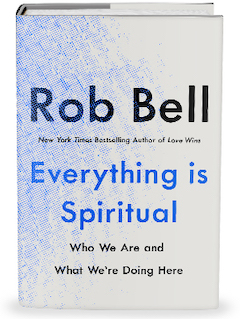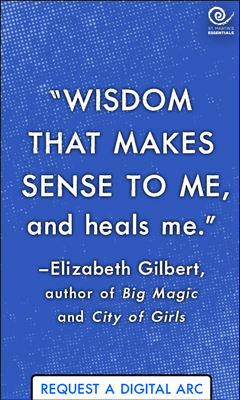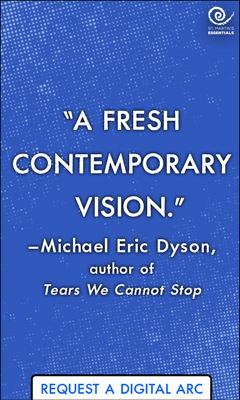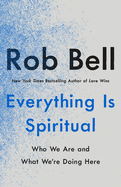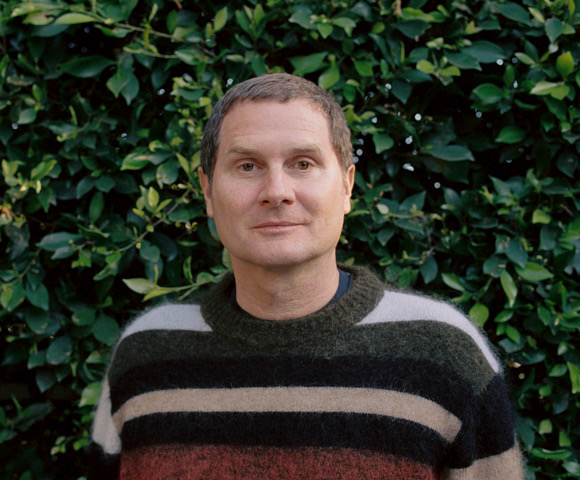Everything Is Spiritual
by Rob Bell
Rob Bell has always had questions. Big questions. His early career as a pastor and author allowed him to explore some of those questions publicly, until his explorations started to make some of his readers (and church members) uncomfortable. After the release of his 2011 book, Love Wins, in which he questioned the typical conservative Christian views of heaven and hell, Bell became a polarizing figure in the evangelical circles he had previously inhabited. Since then, he's released five more books and gone on speaking tours, continuing to wrestle with the enduring big questions about human life, spirituality, love and the Bible. In his 11th book, Everything Is Spiritual, Bell takes his widest angle yet on the nature of life, mixing those questions with humor, humility, family history and--surprisingly--a hefty dose of quantum physics. It's an odd combination, but (as the title suggests) it's all connected, and it all speaks to living as a human being on this vexing, beautiful planet.
Bell begins his narrative on his grandmother's porch in Michigan, where he escaped when the rules-driven environment of school and church became too much, "bursting in with all my angst and ache and curiosity and laughs." Bell's grandmother Eileen provided a safe place for her teenage grandson, who was just beginning to understand that life is more complex--more full of both joy and pain--than any of the rules would have him believe.
As a young man, Bell became a minister, delving deeply into sacred texts and crafting engaging sermons. His curiosity and talent for public speaking led him to seminary in California, then back to Michigan, where he founded a church that mushroomed into a megachurch. Everything Is Spiritual touches briefly on these and other life events, including Bell's marriage to his wife, Kristen, and their eventual return to California. But Bell's story, in both form and content, is not remotely linear. Like the swirling galaxies that have earned his abiding curiosity, the narrative twists back on itself, returning again and again to those enduring questions. Bell is less interested in answers than he is in diving into the complicated layers of life and love, and learning to embrace every bit of his own story, even--especially--the painful parts. "It was all part of it," he insists. "All the wondering and wandering. They show me that it was all good, even when it wasn't."
Readers of Bell's previous works will find his style familiar: there are no chapters, no section headings, not even that many traditional paragraphs. Instead, there are rambling prose-poem-like sections of narrative interspersed with clean, crisp declarative sentences. Throughout, Bell urges readers to keep asking questions--not so much why as what. And, when trouble or tragedy inevitably strikes, Now what? The narrative lopes along, sometimes doing a backflip or taking a hard left turn, bouncing from a seminary lecture hall to a rock concert to Bell's office during his pastoring days. Readers get successive glimpses into the crisis of faith and spiritual exhaustion that led Bell to challenge the evangelical culture in which he had become embedded. Along the way, his probing questions nudge readers to consider their own spiritual journeys and question their own assumptions about what it means to have faith and to live a worthwhile life. The beauty of the book lies not only in its rambling, discursive, conversational form, but in its repeated urging to embrace it all.
Spiritual leaders of all stripes (and political persuasions) have aired their opinions on Bell: his theology, his personality, every one of his books. The Bell who appears in these pages is thoughtful, fun-loving, whimsical and kind. Most of all, he is held in thrall by a deep curiosity and wonder: about the universe, the world, the human heart, and every single story that might possibly shed the tiniest bit of light on any of the above. He weaves together stories from the Old and New Testaments, childhood memories, the vagaries of subatomic particles and, with Elizabeth Gilbert, an audience q&a session in a parking lot. He wants his readers to share in the mystery and delight waiting for them in the world, and to find ways to deal with the pain, too. The whole thing, he insists, is "an endless invitation to participate" and he doesn't want anyone to miss a single minute of that party. From the human reproductive system to the birth of galaxies and right back to his grandmother's porch in Michigan, Bell takes readers along on his own twisty, confusing, ultimately joyous journey. "There's a universe there in your chest, a cosmos in your heart," he says, recalling e.e. cummings's oft-quoted line: "listen: there's a hell/ of a good universe next door." Bell's response is the same as cummings's conclusion: "Let's go." --Katie Noah Gibson



